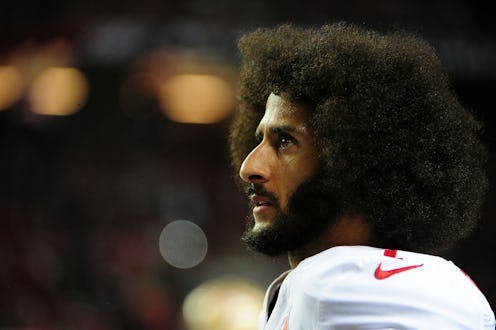News
Trump's Kaepernick Comments Might Be A Diversion

Presidents are more than allowed to voice their opinions about non-political matters, but it seems that Donald Trump can't stop. During a rally in Kentucky on Mar. 20, the president cited an article that quoted anonymous National Football League officials worry that hiring former San Francisco 49ers quarterback Colin Kaepernick would result in "a nasty tweet from Donald Trump." It was the second time Trump made disparaging comments about Kaepernick, and his focus on a football player he disagrees with on what some are calling one of his worst days as president is telling.
During his speech in Louisville, Trump warmed up the crowd with a story about the "San Francisco quarterback" he refused to name, citing a Bleacher Report article that claimed some NFL officials were afraid to sign Kaepernick because it could possibly lead to protests from fans or that "Trump will tweet about the team." With an incredulous smirk, Trump asked the crowd "can you believe it," a comment that brought cheers from the audience. He went on to say that he came to Kentucky because "the people of Kentucky because they like when people actually stand for the American flag."
Despite the joking tone Trump struck, the timing of these comments is telling — they took place on the same day that FBI Director James Comey confirmed that the bureau is investigating alleged ties between Trump's campaign and Russia's election-hacking and denied the president's claim that the Obama administration wiretapped Trump Tower during the election. Trump did not comment on Comey's testimony at all during the speech, and his only comments about alleged difficulties in the GOP's Obamacare overhaul blamed the media for the bill's rocky start.
Although CNN lauded Trump's lack of response to the FBI director's testimony as a sign of restraint, reports from local news stations in Kentucky claimed that the White House told reporters Trump would not answer questions about wiretapping or Russia. So, a president will comment on an athlete he doesn't like but specifically refuses to discuss controversial news that involves his administration.
Whether Trump was simply speaking in his bizarre and well-documented stream-of-consciousness rhetoric style or purposefully diverting media attention by discussing Kaepernick instead of the day's pertinent news is entirely un-knowable. There does, however, seem to be a pattern of Trumpian diversions that range from meeting with Kanye West while under scrutiny about potential conflicts of interest to speculation that Trump's Twitter habits themselves are diversionary in nature.
Whether or not Trump brought up his beef with Kaepernick to divert attention from his much more important beef with the director of the FBI, it's still telling that we now have a president who would rather trash a football player than be transparent with his constituents about a scandal in which his young administration is involved.
It sets a problematic precedent for his administration going forward, and speaks to Trump's presidential priorities and his media strategy — both of which are cause for concern.